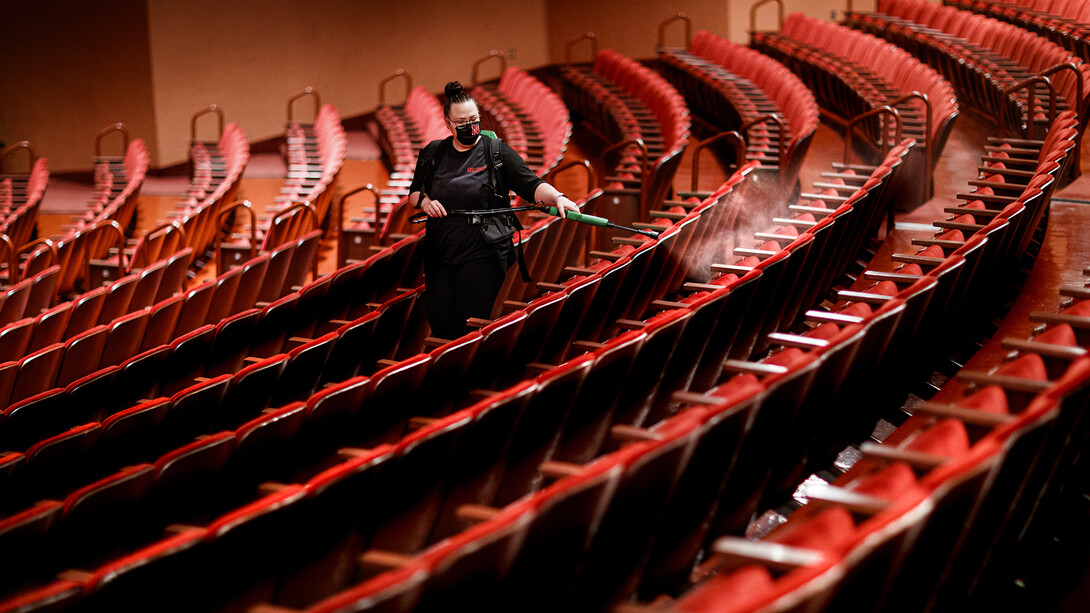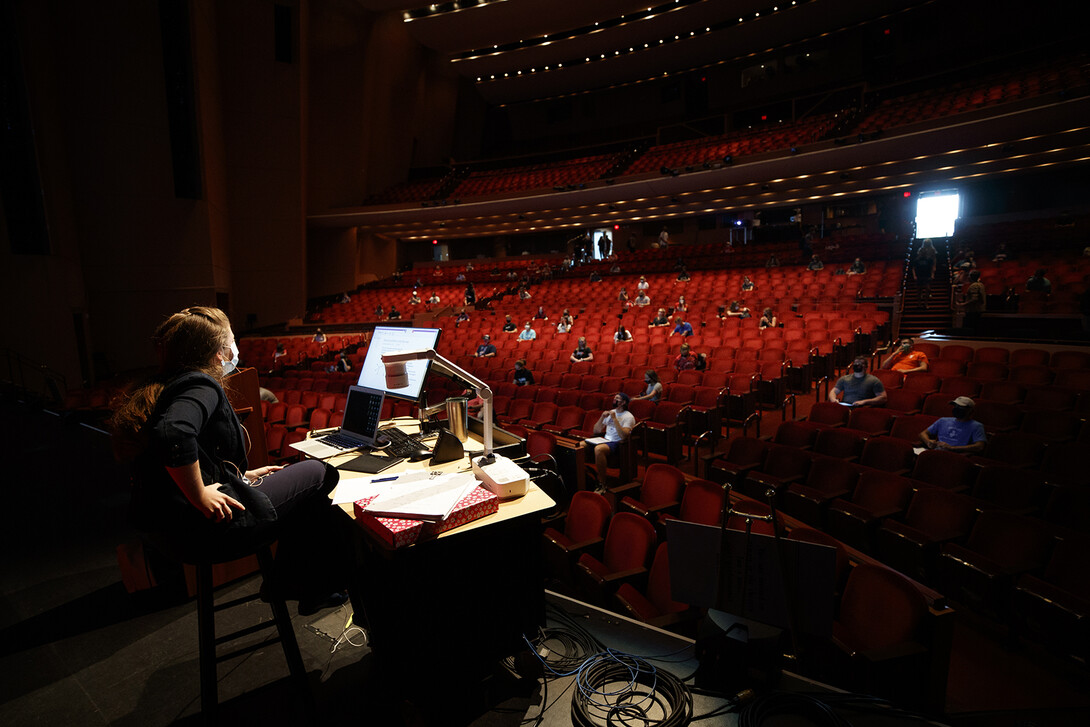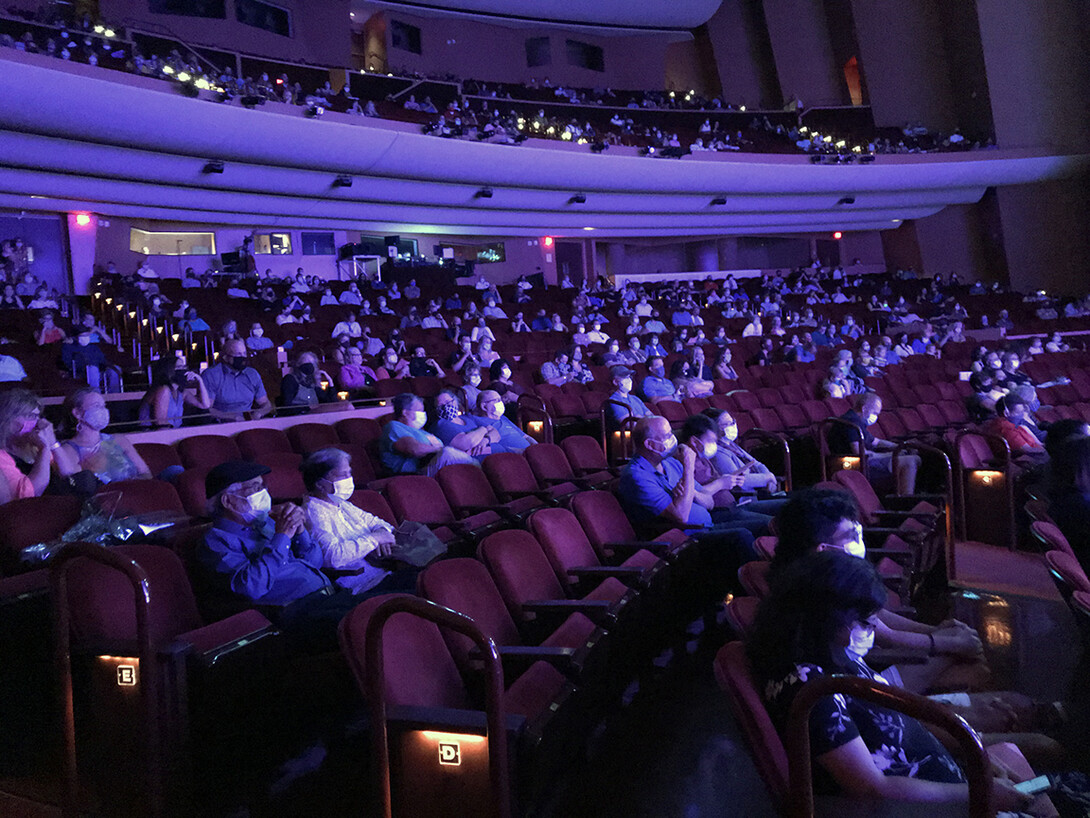
Innovative responses to the global pandemic are directing the spotlight on Nebraska’s Lied Center for Performing Arts.
The University of Nebraska–Lincoln performing arts venue is one of, if not the first, indoor stage in the United States to host shows after COVID-19 prompted national shutdowns in late March. Rather than wait for the virus to clear, Lied Center staff worked in concert with health officials, followed national guidelines and adapted policies and procedures that elevated public safety over venue capacity.
The Lied reopened in July, hosting a pair of youth dance recitals that drew more than 500 into the auditorium. That success led to a full-performance schedule this fall and a partnership through which the university is using the facility for large lecture courses (primarily chemistry instruction).
“Our team jumped right in and found a way for us to reopen and safely serve our community despite the pandemic,” said Bill Stephan, executive director of the Lied Center. “Their dedication and creative solutions are why we are able to help the university while also fulfilling our mission of educating and inspiring people through the performing arts.”
Health protocols at the Lied Center are multi-layered and involve similar approaches to protect students and instructors during the day and performance arts patrons attending shows in the evening.
Primary protection is provided via facial coverings, which are required for all events at the Lied.

For classes, students enter via the box office doors — where they are greeted by ushers, like every other Lied event — and file up stairways to one of four doors to the main floor. Each is assigned a seat for the entire semester in a system that limits exposure (observing all social distancing guidelines) across all daily lectures.
“We’ve made it so no two students sit in the same seat on any given day,” said Mark Moore, associate director of event and facility services for the Lied Center. “And, it’s all one way traffic — students come in the box office doors and enter the main floor from the back, and they leave through the lower doors and side exits.”
Between classes, the Lied’s facilities crew wipes down surfaces that may have been touched — from handrails and doors (which are always propped open to limit touching) to the restrooms that have been upgraded to feature sensors that automatically flush toilets and dispense water, soap and paper towels.
In addition, the building also features 48 touchless hand sanitizer stations alongside four of the large pump-style designs provided by the university. The Lied also provides each lecturer with their own wireless mic, sanitizing them daily. And, the building’s HVAC system features upgraded filters and an increase on the amount of fresh air that is being pulled in each minute.
“Honestly, the students have been great,” Moore said. “We’ve only had to provide two masks — both of which were forgotten for an 8:30 a.m. class. And it’s been a pleasure to get to know them.”
After the final class is dismissed each day (whether there is a show that evening or not), Lied Center facilities staff sanitize the entire lower seating area and Johnny Carson Theatre with electrostatic sprayer and an Environmental Protection Agency-approved cleaner that kills coronavirus in 45 seconds.
“I had a patron call me and say they were not comfortable knowing that students were coming in here for classes during the day,” Moore said. “I explained all that we do, gave her the whole spiel. When I finished, she said it sounded safer than going to the grocery store and that she was excited for our next show.”
The Lied Center’s season heats up this weekend with a Sept. 24 performance by Paul Barnes, professor of music in Nebraska’s Hixson-Lied College of Fine and Performing Arts, and two-shows of the record-breaking Off-Broadway show, “Newsical the Musical” on Sept. 26.

Evening performances mirror public health protocols followed during class sessions.
“We’ve tried to make everything as touchless as possible,” Moore said. “Tickets are scanned at the door without touching. Programs are placed on a table using gloves to unpack them. And, our tickets and doors are numbered to help patrons find seats easier, limiting interactions with the ushers.”
Seating features a very specific diagonal pattern that follows social distancing, allows every row to be used, and limits potential exposure caused by patrons crossing.
One major change is patrons select a section of the venue to sit in rather than specific seats. The Lied’s box office team determines where each individual or group will be seated in their designated area, establishing the pattern that allows for social distancing.
“The initial idea was that we would have to skip a row to allow for social distancing. But we went out with a six-foot ruler and found this diagonal pattern is more efficient,” Moore said. “It allows us to seat a little over 600 in our 2,200 seat hall.”
Behind scenes, the Lied Center staff are committed to strict observance of all health-related protocols. Every employee, performer or traveling show crew member must pass a screening that includes taking their temperature and answering questions related to exposure. Technicians are assigned to specific areas and required to disinfect soundboards and related equipment. And, even the Lied’s dressing rooms have been reconfigured to allow for social distancing.
“We’re doing everything we can to limit the spread among everyone who comes into the Lied Center,” Moore said. “And, we’re constantly monitoring best practices and adjusting our protocols to adjust as needed in response to the virus.”
In August — after successfully hosting the two dance recitals — the Lied Center received a congratulatory note. It identified them as the first of the 17 Major University Presenters Consortium members to reopen and to be among the first (maybe the first) major performing arts center in North America to host an audience indoors since March.
The notice has led the Lied to become an information source for other venues seeking to reopen. Moore said the Lied has shared its protocols with performing arts theatres across the region, primarily at other universities and within the Midwest.
“It’s taken all hands on deck for our entire crew, but we are open and providing a bit of hope for students on campus and our patrons,” Moore said. “It’s been a lot of work and we’re a little bit tired, but we’re extremely proud that our work is helping students in the classroom and providing some hope and escapism to our patrons.”







